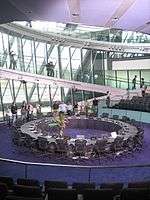London Assembly
The London Assembly is a 25-member elected body, part of the Greater London Authority, that scrutinises the activities of the Mayor of London and has the power, with a two-thirds super-majority, to amend the Mayor's annual budget and to reject the Mayor's draft statutory strategies.[1] The London Assembly was established in 2000 and meets at City Hall on the south bank of the River Thames, close to Tower Bridge. The Assembly is also able to investigate other issues of importance to Londoners (transport, environmental matters, etc.), publish its findings and recommendations, and make proposals to the Mayor.
| Type | |
|---|---|
| Type | |
| History | |
| Founded | 3 July 2000 |
| Leadership | |
Deputy Chair | |
Group leaders |
|
| Structure | |
| Seats | 25 |
 | |
Political groups |
|
| Committees | List
|
| Elections | |
| Additional Member System | |
Last election | 5 May 2016 |
Next election | 6 May 2021 |
| Meeting place | |
 | |
| City Hall, Southwark | |
| Website | |
| www.london.gov.uk | |
.jpg) |
|---|
| This article is part of a series on the politics and government of London |
|
|
|
Assembly Members
The Assembly comprises 25 Assembly Members elected using the Additional Member System of proportional representation, with 13 seats needed for a majority. Elections take place every four years – at the same time as for the Mayor. There are 14 geographical super-constituencies each electing one Member, with a further 11 members elected from a party list to make the total Assembly Members from each party proportional to the votes cast for that party across the whole of London using a modified D'Hondt allocation.[2] A party must win at least 5% of the party list vote in order to win any seats. Members of the London Assembly have the post-nominal title 'AM'. The annual salary for a London Assembly Member is approximately £59,000.[3]
Former Assembly Members
Since its creation in 2000, fifteen Assembly Members have subsequently been elected to the House of Commons: David Lammy, Meg Hillier, Diana Johnson and Florence Eshalomi for Labour; Andrew Pelling, Bob Neill, Angie Bray, Bob Blackman, Eric Ollerenshaw, Victoria Borwick, James Cleverly, Kit Malthouse, Kemi Badenoch and Gareth Bacon for the Conservatives; and Lynne Featherstone for the Liberal Democrats. One Assembly Member, Jenny Jones, was appointed to the House of Lords as the first life peer for the Green Party, and simultaneously sat in the Assembly until May 2016. Sally Hamwee, Graham Tope and Toby Harris were life peers elected to the Assembly, while Lynne Featherstone and Dee Doocey were appointed peers after leaving the Assembly. In addition, Val Shawcross, Assembly Member for Lambeth and Southwark was selected, but unsuccessful, as the Labour parliamentary candidate for the constituency of Bermondsey and Old Southwark at the 2010 general election, as was Navin Shah who stood for Labour in Harrow East in 2017. Andrew Dismore, Graham Tope, and the late Richard Tracey are all former MPs who were later elected to the Assembly. One Assembly Member – John Biggs, former AM for City and East – became the directly-elected Mayor of Tower Hamlets in 2015. He is currently serving as the Mayor, having been re-elected in 2018.
Structure of the Assembly
London Assembly elections have been held under the Additional Member System, with a set number of constituencies elected on a first-past-the-post system and a set number London-wide on a closed party list system. Terms are for four years, so despite the delayed 2020 election, which will be held in 2021, the following election will be in 2024.
In December 2016, an Electoral Reform Bill was introduced which would have changed the election system to first-past-the-post.[4] At the 2017 UK general election, the Conservative Party manifesto proposed changes to how the Assembly is elected, to first-past-the-post.[5] However, since the general election of 2017, which resulted in a hung Parliament with the Conservatives and the Democratic Unionist Party in a confidence and supply arrangement, no action has been taken with regard to the electoral arrangements of the London Assembly and it is generally assumed that the 2020 election, which has been delayed to 2021 due to the COVID-19 pandemic, will be held on the current electoral system of AMS (constituencies and regional list)
| Political party | Assembly members | ||||||
|---|---|---|---|---|---|---|---|
| 2000 | 2004 | 2008 | 2012 | 2016 | |||
| Labour | 9 | 7 | 8 | 12 | 12 | 12 / 25 | |
| Conservative | 9 | 9 | 11 | 9 | 8 | 8 / 25 | |
| Green | 3 | 2 | 2 | 2 | 2 | 2 / 25 | |
| UKIP | 2 | 2 | 2 / 25 | ||||
| Liberal Democrat | 4 | 5 | 3 | 2 | 1 | 1 / 25 | |
| British National Party | 1 | 0 / 25 | |||||
On 12 December 2018, following Peter Whittle's departure from UKIP, he and David Kurten disbanded the UKIP grouping and formed the Brexit Alliance group, though Kurten still remains a member of UKIP.
In March 2019, following Tom Copley and Fiona Twycross departure to full-time Deputy Mayor roles, Murad Qureshi and Alison Moore replaced them as Labour Assembly Members, the term of office having been extended from May 2020 to May 2021, due to no elections being held during the COVID-19 pandemic.
List of current Assembly Members

List of chairs of the London Assembly
| Name | Entered office | Left office | Political party | |
|---|---|---|---|---|
| Trevor Phillips | May 2000 | May 2001 | Labour | |
| Sally Hamwee | May 2001 | May 2002 | Liberal Democrat | |
| Trevor Phillips | May 2002 | February 2003 | Labour | |
| Sally Hamwee | February 2003 | May 2004 | Liberal Democrat | |
| Brian Coleman | May 2004 | May 2005 | Conservative | |
| Sally Hamwee | May 2005 | May 2006 | Liberal Democrat | |
| Brian Coleman | May 2006 | May 2007 | Conservative | |
| Sally Hamwee | May 2007 | May 2008 | Liberal Democrat | |
| Jennette Arnold | May 2008 | May 2009 | Labour | |
| Darren Johnson | May 2009 | May 2010 | Green | |
| Dee Doocey | May 2010 | May 2011 | Liberal Democrat | |
| Jennette Arnold | May 2011 | May 2013 | Labour | |
| Darren Johnson | May 2013 | May 2014 | Green | |
| Roger Evans | May 2014 | May 2015 | Conservative | |
| Jennette Arnold | May 2015 | May 2016 | Labour | |
| Tony Arbour | May 2016 | May 2017 | Conservative | |
| Jennette Arnold | May 2017 | May 2018 | Labour | |
| Tony Arbour | May 2018 | May 2019 | Conservative | |
| Jennette Arnold | May 2019 | May 2020 | Labour | |
| Navin Shah | May 2020 | Incumbent | Labour | |
Committees
The Assembly has formed the following committees:[6]
- Audit Panel, chaired by Unmesh Desai
- Budget and Performance Committee, chaired by Gareth Bacon
- Budget Monitoring Sub-Committee, chaired by Gareth Bacon
- Confirmation Hearings Committee chaired by Andrew Boff
- Economy Committee, chaired by Leonie Cooper
- Education Panel, chaired by Jennette Arnold[7]
- Environment Committee, chaired by Caroline Russell
- EU Exit Working Group, chaired by Len Duvall[8]
- Fire, Resilience and Emergency Planning Committee, chaired by Andrew Dismore
- GLA Oversight Committee, chaired by Len Duvall
- Health Committee, chaired by Onkar Sahota
- Housing Committee, chaired by Tom Copley
- Planning Committee, chaired by Andrew Boff
- Police and Crime Committee, chaired by Unmesh Desai
- Regeneration Committee, chaired by Tony Devenish
- Transport Committee, chaired by Florence Eshalomi
The Police and Crime Committee was set up under the terms of the Police Reform and Social Responsibility Act 2011 in order to scrutinise the work of Mayor's Office for Policing and Crime, which replaced the Metropolitan Police Authority.[9]
Result maps
Note that these maps only show constituency results and not list results.
 2000 results
2000 results 2004 results
2004 results 2008 results
2008 results 2012 results
2012 results 2016 results
2016 results
References
- "Localism Act 2011". Legislation.gov.uk. 7 February 2012. Retrieved 3 April 2015.
- "BBC News – How the London election works". bbc.co.uk. 25 April 2012. Retrieved 18 November 2012.
- "Salaries, expenses, benefits and workforce information". London City Hall. 19 March 2015. Retrieved 21 June 2020.
- Stone, Jon (23 December 2016). "Tory and Labour MPs gang up in bid to strip London Assembly of PR voting system". The Independent.
- "Tories confirm London Assembly also faces election rules shake-up". Mayor Watch. 19 May 2017.
- "London Assembly – Membership of Committees/Bodies and Terms of Reference 2019/20 | London Assembly" (PDF). london.gov.uk. Archived from the original (PDF) on 14 August 2019. Retrieved 14 August 2019.
- "Committee Details – Education Panel | London City Hall". london.gov.uk. Retrieved 17 August 2019.
- "EU Exit Working Group | London City Hall". london.gov.uk. Retrieved 17 August 2019.
- "Police Reform and Social Responsibility Act 2011". Legislation.gov.uk. 26 October 2011. Retrieved 29 January 2015.